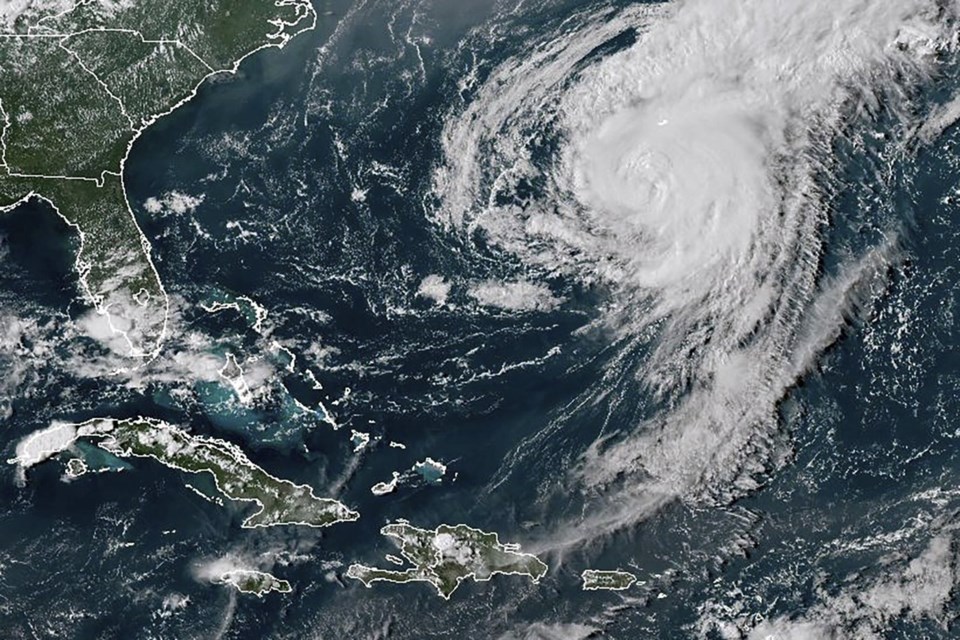SAN JUAN, Puerto Rico (AP) — Hurricane Ernesto made landfall on the tiny British Atlantic territory of Bermuda early Saturday as residents hunkered down.
The wide category 1 storm was directly over the the wealthy territory at 6 a.m. Saturday, with maximum sustained winds of 85 mph (140 kph). The U.S. National Hurricane Center warned of strong winds, a dangerous storm surge and significant coastal flooding.
It said some 6 to 9 inches (150-225 millimeters) of rain was expected to fall on Bermuda. “This rainfall will likely result in considerable life-threatening flash flooding, especially in low-lying areas on the island,” it said.
Due to the large size of the storm and its slow movement, hurricane-strength winds are expected to continue until Saturday afternoon, with tropical storm-strength winds continuing well into Sunday, the Bermuda government said. Ernesto is moving toward the north-northeast at around 9 mph (15 kph).
The NHC reported life-threatening surf and rip currents on the east coast of the United States and said they would reach Canada during the course of the day. Ernesto is forecast to be near or east of Newfoundland by Monday night.
Bermuda power utility BELCO said that as of late Friday, power was out to 31% of its customers. It described itself as being in “an active state of crisis.”
“Our crews are no longer out in the field working as it is no longer safe for them. They will now rest until it is deemed safe for them to begin restoration efforts,” BELCO added.
In preparation for the storm, officials in the wealthy British territory had suspended public transportation and closed the airport on Friday night.
“Hurricane Ernesto seriously threatens our community,” National Security Minister Michael Weeks said. “This is not a storm to be taken lightly.”
Bermuda is an archipelago of 181 tiny islands whose total land mass is roughly the size of Manhattan.
According to AccuWeather, it’s uncommon for the eye of a hurricane to make landfall in Bermuda. It noted that, before today, since 1850 only 11 of 130 tropical storms that came within 100 miles (160 kilometers) of Bermuda had landfall.
The island is a renowned offshore financial center with sturdy construction, and given its elevation, storm surge is not as problematic as it is with low-lying islands.
Ernesto previously battered the northeast Caribbean, where it left hundreds of thousands of people without power or water in Puerto Rico after swiping past the U.S. territory as a tropical storm.
More than 180,000 out of nearly 1.5 million clients were still without power more than two days after the storm. Another 170,000 were without water as the National Weather Service issued yet another severe heat advisory, warning of “dangerously hot and humid conditions.”
“It’s not easy,” said Andrés Cabrera, 60, who lives in the north coastal city of Carolina and had no water or power.
Like many on the island, he could not afford a generator or solar panels. Cabrera said he was relying for relief only “on the wind that comes in from the street.”
Officials said they hoped to restore power to 90% of nearly 1.5 million customers in Puerto Rico by Sunday, but have not said when they expect power to be fully restored.
Of 152 locations of critical infrastructure without electricity that are being prioritized, 36 now have power, said Juan Saca, president of Luma Energy, a private company that operates the transmission and distribution of power on the island.
In the neighboring U.S. Virgin Islands, crews also were working to restore power, with 80% of customers back online.
Ernesto is the fifth named storm and the third hurricane of this year’s Atlantic hurricane season.
The National Oceanic and Atmospheric Administration has predicted an above-average Atlantic hurricane season this year because of record warm ocean temperatures. It forecast 17 to 25 named storms, with four to seven major hurricanes.
——
This story has been corrected to give the conversion of rainfall as millimeters instead of centimeters.
Dánica Coto, The Associated Press

